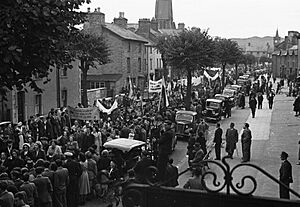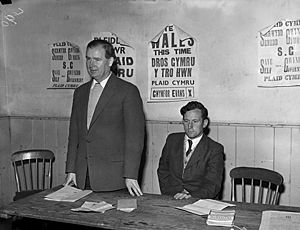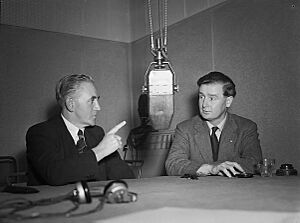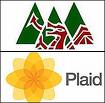Plaid Cymru facts for kids
Quick facts for kids
Plaid Cymru – the Party of Wales
|
|
|---|---|
 |
|
| Leader | Rhun ap Iorwerth |
| Deputy Leader | Delyth Jewell |
| Westminster Leader | Liz Saville Roberts |
| Chair | Marc Jones |
| Honorary President | The Lord Wigley |
| Founded | 5 August 1925 |
| Headquarters | Tŷ Gwynfor Marine Chambers Anson Court Atlantic Wharf Cardiff CF10 4AL |
| Youth wing | Plaid Ifanc |
| LGBT wing | Plaid Pride |
| Disability wing | Plaid Cymru Anabledd |
| Membership (2022) | |
| Ideology | |
| Political position | Centre-left |
| European affiliation | European Free Alliance |
| Colours | Green Yellow |
| House of Commons (Welsh seats) |
4 / 32
|
| House of Lords |
1 / 777
|
| Senedd |
12 / 60
|
| Police and crime commissioners in Wales |
1 / 4
|
| Councillors in Wales |
201 / 1,231
|
| Councils led In Wales |
4 / 22
|
| Website | |
| (Welsh) (English) |
|
Plaid Cymru (which means "Party of Wales" in Welsh) is a political party in Wales. It is often called simply Plaid. The party believes in Welsh independence, meaning Wales would be a country separate from the United Kingdom. It also supports social democracy, which means it wants a fair society where everyone has equal chances.
The party was started on August 5, 1925, and was first called Plaid Genedlaethol Cymru. In 1966, Gwynfor Evans became the first Plaid Cymru member to win a seat in the UK Parliament.
Plaid Cymru has been an important party in the Senedd (the Welsh Parliament) since it was created in 1999. They have often been the main opposition party. From 2007 to 2011, they worked with the Welsh Labour party in a special partnership government.
In May 2023, Adam Price stepped down as leader. In June 2023, Rhun ap Iorwerth became the new leader. In the 2024 UK general election, Plaid Cymru won four seats in Wales.
Contents
What Plaid Cymru Wants
Plaid Cymru has several main goals for Wales.
Independence and Europe
The party wants Wales to become an independent country within Europe. This means Wales would make its own laws and decisions, but still be part of the wider European community.
Fairness and Environment
Plaid Cymru aims for a strong economy, social fairness for everyone, and a healthy natural environment. They also want a society where all citizens are treated equally and different cultures are respected.
Welsh Language and Global Role
They want to help the Welsh language grow and be used more. The party also wants Wales to be known around the world and to join the United Nations.
More Powers for Wales
While Wales is part of the UK, Plaid Cymru wants the UK Government to give more powers to Wales. This includes control over things like broadcasting, the Crown Estate (land and property owned by the King), welfare, and railways.
Other Key Policies
- They are against nuclear power and nuclear weapons.
- They want to lower the voting age to 16 for all elections. (It is already 16 for Senedd and local elections in Wales).
- They support making social care free for everyone who needs it.
In 2021, Plaid Cymru worked with the Welsh Labour government on a special agreement. This agreement included plans for:
- Free school meals for all primary school children.
- Free childcare for all two-year-olds.
- Action to deal with too many second homes and housing that is too expensive.
- Creating a national care service.
- More money for flood defence.
In 2025, the party leader, Rhun ap Iorwerth, said there was no plan for an independence vote in the first term if Plaid Cymru won the next Senedd election. However, Welsh independence remains an official goal for the party.
History of Plaid Cymru
How it Started
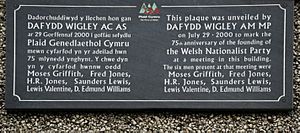
Before Plaid Cymru, there wasn't a party focused only on creating a Welsh government. Plaid Genedlaethol Cymru was formed on August 5, 1925. Its first main goal was to keep the Welsh language strong.
In the 1929 general election, the party ran for Parliament for the first time. They didn't win many votes, partly because they weren't very focused on Westminster politics at first.
The 1930s
By 1932, the party added goals like self-government for Wales and having Wales represented at the League of Nations. However, the party was still mostly for Welsh speakers and intellectuals.
In 1936, three leaders of the party, Saunders Lewis, David John Williams, and Lewis Valentine, set fire to a new RAF air base in Penyberth. They were protesting because the base was built in a Welsh-speaking area. Their trial and imprisonment made them famous and helped the party gain more members.
The 1940s
During the Second World War, Plaid Cymru stayed neutral. In 1945, the party ran in seven elections, including in south Wales for the first time. Around this time, Gwynfor Evans became the party president.
The 1950s
Under Gwynfor Evans's leadership, Plaid Cymru grew into a more recognized political party. Their share of votes increased in general elections. A big issue that helped the party grow was the plan to flood the village of Capel Celyn in 1957 to supply water to Liverpool. This showed that Welsh MPs in Westminster couldn't stop such plans, which made more people think Wales needed more control over its own affairs.
The 1960s
In 1962, Saunders Lewis gave a famous radio talk called Tynged yr Iaith (The fate of the language). He warned that the Welsh language could disappear if people didn't act. This led to the creation of Cymdeithas yr Iaith Gymraeg (the Welsh Language Society).
In 1966, Gwynfor Evans won the Carmarthen seat in a special election. This was a big moment for the party. They also gained a lot of support in other elections, showing that people were unhappy with the Labour government's policies, especially in coal mining areas.
The 1970s
In the 1970 general election, Plaid Cymru ran in every seat in Wales for the first time. Their vote share went up a lot. Gwynfor Evans lost his seat but won it back in October 1974. The party also gained two more MPs.
The rise of Plaid Cymru led the UK government to look into giving Wales more self-rule. However, a vote in 1979 on creating a Welsh Assembly was strongly defeated. Plaid Cymru also campaigned to leave the European Economic Community (EEC) in 1975, but Welsh voters chose to stay.
The 1980s
Dafydd Wigley became president in 1981. The party adopted a policy of "community socialism." Gwynfor Evans successfully campaigned for S4C, a Welsh-language TV channel, even threatening a hunger strike. In 1984, Dafydd Elis-Thomas became president, moving the party more to the left. In 1987, Ieuan Wyn Jones won a seat for the party.
The 1990s
In the 1992 general election, Plaid Cymru gained a fourth MP. In 1997, after a Labour government was elected, another vote was held on creating the National Assembly for Wales. This time, the vote was narrowly won.
Plaid Cymru became the main opposition party in the new Assembly, winning 17 seats. They gained seats in areas that usually voted Labour, showing they were growing beyond their traditional strongholds. Before the 1999 Assembly election, Plaid Cymru changed its policy to support continued membership in the European Union instead of full Welsh independence. They also adopted social democracy for their economic policy.
The Senedd Era (1999-Present)
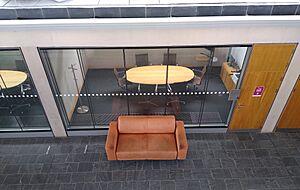
First Assembly (1999–2003)
In the 1999 election, Plaid Cymru won many seats in traditional Labour areas. They became the second-largest party in the Assembly. However, their leader, Dafydd Wigley, resigned due to health reasons. Ieuan Wyn Jones took over.
Second Assembly (2003–2007)
In the 2003 Assembly elections, Plaid Cymru's number of seats dropped from 17 to 12. They remained the second-largest party. In 2003, Dafydd Iwan became the party president, and the party officially supported Welsh independence within Europe again.
In 2006, the party changed its image and logo. They started using "Plaid" as their main name and adopted the yellow Welsh poppy as their symbol.
Third Assembly (2007–2011)
In the 2007 Assembly election, Plaid Cymru increased its seats from 12 to 15. They formed a special partnership government with Welsh Labour. Ieuan Wyn Jones became the Deputy First Minister of Wales. This partnership included a promise to hold a vote on giving the Assembly full law-making powers.
Fourth Assembly (2011–2016)
In the 2011 Assembly election, Plaid Cymru dropped to third place. Ieuan Wyn Jones stepped down as leader. On March 15, 2012, Leanne Wood was elected as the new leader. She was the first female leader of the party. In 2013, Rhun ap Iorwerth won a special election to become the Assembly Member for Ynys Môn.
Fifth Assembly/Senedd (2016–2021)
In the 2016 Welsh Assembly elections, Plaid Cymru gained one seat and became the second-largest party. They briefly became the official opposition. Although they campaigned to leave the European Economic Community in 1975, Plaid Cymru campaigned to remain in the European Union in the 2016 referendum.
In September 2018, Adam Price won the party's leadership election, becoming the new leader. In the 2019 UK general election, Plaid Cymru kept their four seats in Westminster.
Sixth Senedd (2021–Present)
In the 2021 Senedd election, Plaid Cymru increased their total seats to thirteen. On November 22, 2021, Plaid Cymru and Welsh Labour announced a special co-operation agreement. This agreement included nearly 50 different policies, such as providing free school meals for all primary school children and creating a national care system.
In May 2023, Adam Price resigned as leader due to issues within the party. Llyr Gruffydd became the interim leader. On June 16, 2023, Rhun ap Iorwerth was elected as the new permanent leader. At a party meeting in October 2023, Rhun ap Iorwerth emphasized that the party is for all people in Wales, not just Welsh speakers.
Independence Commission 2020
Before the 2019 general election, Adam Price announced a commission to study how Welsh independence could work. The commission released its report on September 25, 2020. It suggested that an independent Wales should join the European Union and explore a closer relationship with England and Scotland. It also recommended ways to improve the Welsh Government and civil service.
The report suggested that there should be a vote to understand what people in Wales want for their political future.
Plaid Cymru Credit Union
Undeb Credyd Plaid Cymru Credit Union Limited is a special savings and loans group for party members. It was started in 1986 and helps members save money and get loans. It is regulated like banks to protect members' savings.
Party Leaders
Plaid Cymru has had several leaders over the years. The leader of the party is also the leader of the Senedd Group.
| Name and portrait | Party office | Constituency (if any) |
Notes |
|---|---|---|---|
 Rhun ap Iorwerth |
Leader of the Senedd Group
and Party Leader |
Ynys Môn | |
 Liz Saville Roberts |
Westminster Group Leader |
MP for Dwyfor Meirionnydd | |
 Dafydd Wigley |
Honorary Party President from 2001 | N/A | Former Party President
Member of the House of Lords |
Past Leaders
The party leader was called the president until March 2000.
| Name | From | To | |
|---|---|---|---|
| 1 | Lewis Valentine | 1925 | 1926 |
| 2 | Saunders Lewis | 1926 | 1939 |
| 3 | John Edward Daniel | 1939 | 1943 |
| 4 | Abi Williams | 1943 | 1945 |
| 5 | Gwynfor Evans | 1 August 1945 | 1981 |
| 6 | Dafydd Wigley | 1981 | 1984 |
| 7 | Dafydd Elis-Thomas | 1984 | 1991 |
| (6) | Dafydd Wigley | 1991 | 4 August 2000 |
| 8 | Ieuan Wyn Jones | 4 August 2000 | 16 March 2012 |
| 9 | Leanne Wood | 16 March 2012 | 28 September 2018 |
| 10 | Adam Price | 28 September 2018 | 16 May 2023 |
| - | Llyr Gruffydd (acting) | 16 May 2023 | 16 June 2023 |
| 11 | Rhun ap Iorwerth | 16 June 2023 | Incumbent |
Deputy Leaders
| Deputy Leader | From | To | |
|---|---|---|---|
| Rhodri Glyn Thomas | 2003 | 2007 | |
| Alun Ffred Jones | 2007 | 2008 | |
| Helen Mary Jones | 2008 | 2012 | |
| Elin Jones | 17 July 2012 | 2016 | |
| Vacant | 2016 | 2018 | |
| Rhun ap Iorwerth & Siân Gwenllian | 23 October 2018 | 27 June 2023 | |
| Delyth Jewell | 27 June 2023 | Present | |
Elected Representatives
Plaid Cymru has members elected to different levels of government.
House of Commons (UK Parliament)
These are the Plaid Cymru Members of Parliament (MPs) who represent Welsh areas in the UK Parliament in London:
| Name | Constituency | Since | Spokesperson role |
|---|---|---|---|
| Ann Davies | Caerfyrddin | 2024 | Deals with topics like work, pensions, environment, education, transport, and culture. |
| Llinos Medi | Ynys Môn | 2024 | Deals with energy, business, trade, housing, health, and equality. |
| Ben Lake | Ceredigion Preseli | 2017 | Group Secretary and Treasurer, speaks on money, foreign affairs, and science. |
| Liz Saville Roberts | Dwyfor Meirionnydd | 2015 | Deals with the Wales Office, justice, home affairs, and defence. |
Senedd (Welsh Parliament)
These are the Plaid Cymru Members of the Senedd (MSs) who represent areas in the Welsh Parliament in Cardiff:
- Llyr Huws Gruffydd, MS for North Wales
- Siân Gwenllian, MS for Arfon
- Rhun ap Iorwerth, MS for Ynys Môn
- Luke Fletcher, MS for South Wales West
- Cefin Campbell, MS for Mid and West Wales
- Elin Jones, MS for Ceredigion
- Delyth Jewell, MS for South Wales East
- Sioned Williams, MS for South Wales West
- Adam Price, MS for Carmarthen East and Dinefwr
- Mabon ap Gwynfor, MS for Dwyfor Meirionnydd
- Peredur Owen Griffiths, MS for South Wales East
- Heledd Fychan, MS for South Wales Central
Local Councillors
Plaid Cymru has 202 councillors in local governments across Wales. They work in local councils to serve their communities.
House of Lords
Plaid Cymru also has members in the House of Lords, which is part of the UK Parliament.
| Name | Date Ennobled |
|---|---|
| Lord Wigley | 24 January 2011 |
| Baroness Smith of Llanfaes | 13 March 2024 |
European Free Alliance
Plaid Cymru works closely with the Scottish National Party (SNP) from Scotland. They often work together in the UK Parliament. Both parties are part of the European Free Alliance (EFA). The EFA is a group of political parties from across Europe that support regional self-rule and independence.
Party Sections
Plaid Cymru has different groups for its members, to make sure everyone is represented:
- Plaid Anabledd: For members with disabilities and neurodivergent members.
- Plaid BME: For Black, Asian, and Minority Ethnic members.
- Councillors' Association: For elected councillors and those who want to become councillors.
- Plaid Ifanc: For young people and student members.
- Merched Plaid: For women members.
- Plaid Pride: For LGBTQIA+ members and their allies.
- Undeb: For members who are also involved in trade unions.
Images for kids
See also
 In Spanish: Plaid Cymru para niños
In Spanish: Plaid Cymru para niños
 | Claudette Colvin |
 | Myrlie Evers-Williams |
 | Alberta Odell Jones |


